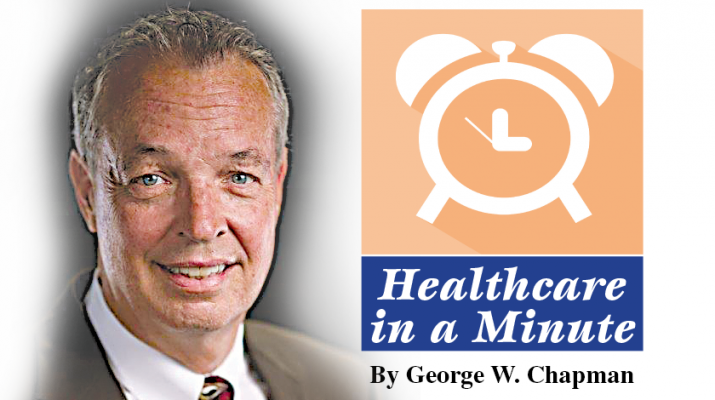By George W. Chapman
Undoubtedly, the pandemic fostered a surge in virtual care or telehealth. In 2019, 7% of patients reported using it. In 2020, 9% of patients availed themselves of it. This year, 36% of patients reported using telehealth for their care. A recent survey of 4,700 consumers by J.D. Powers revealed underlying dissatisfaction among telehealth users. On the positive side, 57% of respondents cited convenience; 47% cited quicker care; 36% cited safety. On the negative side, 24% said services were too limited. Cost, confusing technology and poor provider information were each cited by 15% of respondents. The take here is the demand for telehealth services will continue beyond the pandemic. Providers and insurers need to accept the new reality and work to improve this new and popular service line.
No “Surprise Billing” Ruling
The intent of this law is to protect unwitting consumers from exorbitant/surprise out-of-pocket costs for services provided by out of network providers. A typical example would be when a consumer goes to an in-network emergency room and then gets a “balance due after insurance payment” from the out of network emergency room group, specialist or radiology group. A recent ruling requires that disputed bills between the out-of-network provider and the commercial payer be settled by an independent arbitrator. Each party submits their preferred dollar amount to the arbitrator. The arbitrator will reward the party that is closest to a national qualified payment amount. The AHA and AMA argue it favors commercial insurers and it is a form of price setting. (Congress actually DOES set prices for Medicare.) Consumer advocates laud the ruling which should mitigate surprise out-of-pocket expenses.
Medicare Advantage (MA) Plans
Open enrollment started Oct. 15. These commercially administered plans, versus the traditional Medicare plan administered by CMS, have seen their enrollment double over the past decade. 42% of eligible seniors have opted to drop their traditional Medicare plan and enroll with a MA plan. There are currently 33 different MA plans offered by commercial giants such as BCBS, United, Anthem, Cigna, Aetna, etc. Premiums may actually decline next year, which could mean less being deducted from a senior’s Social Security check. All of these MA plans offer extra services beyond traditional Medicare to both entice enrollees and improve their care, including: transportation, dental, optical, auditory, mental health, home visits, food delivery and even pest control. All of the major insurers are expanding their footprints and markets to capture more seniors.
Fake C19 Cards
Two VA employees in Detroit have been charged with theft, fraud and conspiring to sell fake proof of vaccination cards. One has been charged with theft of government property, (actual vaccination record cards). The accomplice has been charged with theft of government agency seals to commit fraud and trafficking in counterfeit goods. Ironically, the fake cards were to be manufactured in China. Beware of scams where a link is sent to a phone requesting personal information (name, Date-of-birth, SSN and picture of your NYS driver’s license) to validate your vaccination status.
ACA Updated
For those who do not get health insurance from their employer or Medicare, the exchanges have been improved. Commercial plans must pay a user fee every year. It is about 2.5% of their premiums for next year. It goes toward consumer information, outreach and navigation programs. The number of navigators has been increased to 1,500 thanks to an $80 million grant from CMS. Open enrollment starts Nov. 1 and ends Jan. 15, 2022. Navigators can now help enrollees with how to appeal for financial assistance and reconciling premium tax credits. The previous administration had reduced the number of navigators, allowed states to reduce benefits via a waiver and to offer short-term plans. CMS rescinded the aforementioned in order to broaden assistance, maintain decent coverage and further strengthen health insurance for more than 20 million consumers.
Drug Prices
Granting Medicare the ability to negotiate drug prices seems like a no-brainer. Literally tens of billions can be saved. Not surprisingly, fear mongering ads by drug manufacturers have increased significantly. Medicare would simply be given the ability to NEGOTIATE (not SET) drug prices. Negotiating is a two-way street, so claims by the drug lobby that fewer drugs will come to market or your particular drug may no longer be available are totally specious. The proposed legislation is now buried in the $3.5 trillion human infrastructure bill. Because there is no control on drug prices like there are on physician and hospital prices, investing in drugs is a safe bet. For example, Walgreens is putting up $970 million for a 71% share in Shields Health Solutions to expand its specialty pharmacy business. Meanwhile, in the hospital world where Medicare sets, not negotiates prices, a survey by Kaufman Hall of 900 hospitals predicts hospitals will lose a collective $54 billion this year. Without COVID-19 relief, it is estimated the loss would be $92 billion. As a result of the pandemic, patient acuity levels are way up, services are delayed and adding insult to injury, drug costs have sky-rocketed.
NYS Vaccine Mandate
Just days after the vaccine mandate deadline, NYS climbed to a 92% vaccination rate among hospital and nursing home healthcare workers. It is one of the highest in the country. This achievement has alleviated fears of massive staff shortages and delays in services. NYS is being sued by a small group claiming a religious exemption based on the fact that cell lines derived from fetuses aborted years ago were used in the development or production of test vaccines. More than 700,000 people in the US have died as a result of COVID-19.


